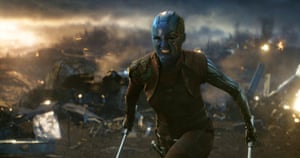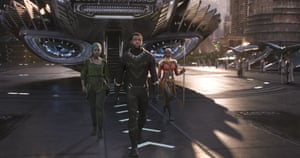In our speeded-up world, last weekend could be considered uneventful, but in one respect it will go down in human history. This was Peak-Geek Weekend – a moment of unprecedented, unrepeatable pop-cultural excitement – that was global in scale. Never, in the field of human geekdom, has so much geeking out been done by so many, over the long-awaited climaxes of two of the most supremely geeky properties ever made.
At the cinema, Avengers: Endgame set itself up to become the biggest film of all time, smashing box-office records like Hulk with a headache. It took more than $1.2bn (£920m) in its first five days: the biggest movie opening in history by some margin, and the fastest any movie has ever passed the $1bn mark. Meanwhile, The Long Night, episode three of season eight of Game of Thrones, took small-screen TV to movie-theatre dimensions: the most expensive single episode ever filmed, of one of the most watched, streamed and pirated series ever.
It’s not just the numbers that single out Avengers and Game of Thrones; it is the fact that both are incredibly long, complex, detailed narratives that fans have been following for about a decade. Avengers: Endgame is the culmination of a multi-stranded, fiendishly interconnected superhero saga that has played out over 21 Marvel movies, beginning in 2008. And that’s not including the myriad Marvel TV series. To be fully prepared for Endgame, fans will need to have watched an estimated 122 hours of Marvel content. It is a similar story with Game of Thrones: last Sunday’s episode was the 70th instalment of the epic saga. So far, its followers have consumed about 70 hours of violent, labyrinthine Westerosian power-politics, and have just three episodes left. While we’re at it, let’s not forget another colossal, geek-friendly saga is coming to a climax this year, with Star Wars Episode IX: The Rise of Skywalker – the finale to a triple trilogy that began more than 40 years ago. Will we ever scale such heights of geekdom again?
This is not the first time in modern history a hit movie or TV show has monopolised the conversation, of course. Yet there is an extra dimension to this nerdy focus. Dallas, for example, had far higher viewing figures than Game of Thrones, and half the western world might have asked: “Who Shot JR?” But that was about the extent of audience curiosity. Few fans were interested in poring over the Ewing family tree, or scrutinising the wording of Cliff Barnes’s contract with Jock. We have devoured long-form shows like The Sopranos and The Wire and admired the scope and depth of the stories. We’ve happily traipsed to James Bond films for half a century. But there was little urge to discuss their finer plot points, ponder their mysteries and catalogue, cross-reference and analyse their stories as there seems to be now. Titles like Avengers, Game of Thrones and Star Wars are firmly in the realm of sci-fi and fantasy, which lend themselves to that level of detail.

Geek status used to connote a small subsection of society who took an obsessive interest in stuff the mainstream didn’t and invariably paid the price in terms of social exclusion. Now you’re an outcast if you’re not into stuff like Avengers or Game of Thrones. Everyone wants to talk about this stuff – with friends, on social media, in online forums, with colleagues, with complete strangers. Either that or they are actively avoiding talking or reading about this stuff because they are not yet up to speed and must preserve their spoiler-free purity at all costs – which is harder than ever now everybody’s talking about it. On Monday, child actor Jacob Tremblay said that children shouting Avengers: Endgame spoilers at other kids amounted to “bullying”. And finally, there are the people who take pride in not engaging with any of this stuff and have no idea who Thanos or Daenerys Targaryen are – so they talk about that instead.
Where once speculation on the nuanced points of such programmes was limited to online backwaters, now it’s all over the place. Media outlets, this one included, run thinkpieces that ponder them from every conceivable angle. From Thor and fat-shaming, to Arya Stark and gender issues, from 20-minute YouTube dissections of Endgame’s ending to the New Yorker’s recent contribution, An Art-Historical Analysis of Cersei Lannister Sipping Wine.
Politicians and pundits even feel obliged to pepper their communications with references to them. “If we don’t vote for the Brexit deal tonight, in the words of Jon Snow, ‘winter is coming,’” warned Michael “relatable” Gove this year. Donald Trump is also fond of tweeting wearisome Thrones-styled memes, with slogans such as: “Sanctions are coming” or: “The wall is coming”. He has done it so much, HBO asked him to stop. To be fair, Thrones’ creator, George RR Martin, responded to Trump’s election victory in 2016 with his own “Winter is coming” prophesy, but he’s allowed to.
We have been scaling this nerd mountain for some time now, steadily placing geekier personalities at the helm of the movie industry (Steven Spielberg is still at it, alongside upstarts such as JJ Abrams, Edgar Wright, Phil Lord and Chris Miller) and the tech industry (Mark Zuckerberg, Bill Gates, Steve Jobs). As well as superheroes and fantasy dynasties, this trend has made modern heroes of geeky outsiders such as, say, the Stranger Things posse, the IT Crowd, the Big Bang Theory team, hacker-with-dragon-tattoo Lisbeth Salander, or unthreatening beta-males such as Seth Rogen, Jesse Eisenberg, Michael Cera and Simon Pegg. Not to mention Donald Glover, who once joked: “I’m a black nerd, and that shit was illegal until, like 2003.” Apple product launches are now cultural events and Comic-Con is as cool as Coachella.
Now that geeks have inherited the earth – or pop culture at least – do terms like “nerd” hold any meaning any more? Outsider status used to be part of what it meant to be a geek or nerd, but that’s difficult to claim now that everyone’s in on it. When the president of the US is referencing Game of Thrones to gloat at his adversaries, and kids who would have been bullied for their geeky interests are now themselves accused of being bullies, we appear to have come full circle. Abrams, a self-identified geek, acknowledged that the meaning has changed. “When I started, a geek was an undeniable loser,” he told the Guardian in 2011. “Long-necked, trips over his own feet, a complete outcast. And now geek means someone who likes science fiction. When I was a kid, it was a huge insult to be a geek. Now it’s a point of pride.”

Yet that pride can be corrosive. Along with the general rise of online bigotry and incivility, we have seen uglier extremes of geek culture entering the mainstream in recent years. There was Gamergate, for example, in which female game developers and critics of video game sexism were subjected to abuse, death threats, rape threats and doxxing (discovery and revelation of personal information such as home address, phone numbers and bank details) by a vengeful, anonymous online community. A similar hate campaign – Comicsgate – was directed at comic book creators deemed to have embraced progressive, feminist or leftwing values, on the part of what could be seen as a far-right geek fringe. One comic’s artist claimed they were “standing up against what they see as a hard push by social justice warriors into their hobby”. The hatred has also been directed at movies, such as 2017’s The Last Jedi and Black Panther, whose foregrounding of women and people of colour prompted similar coordinated attacks to to manipulate their ratings on the reviews website Rotten Tomatoes.These contingents no longer represent modern pop culture, says Michi Trota, a Chicago-based writer and editor of the sci-fi/fantasy magazine Uncanny. “There’s still a common misperception that nerds are primarily cisgender, heterosexual, able-bodied white men who are socially awkward and/or not good at sports,” she says. “It’s incredibly frustrating how this misperception persists, because it’s such a narrow view of who geeks are and can be, and it contributes to a lot of problems with things like misogyny, racism, ableism, cissexism and heterosexism in geek culture.”
These elements reveal how geek culture can be policed from within as well as without. It is no longer a matter of the mainstream rejecting sci-fi nerds and comic-book fans; now it is the other way around. The “outsider” status can lead to claims of victimisation, and an impulse to attack and exclude others. A 2012 essay by the academics Kom Kunyosying and Carter Soles refers to geek status as a “simulated ethnicity” – a term they use “to describe the way geeks melodramatically cast themselves as members of a marginalised identity to foreground their validity and authenticity”. Portrayals of non-alpha white males, in particular, in popular culture, have cast geekdom as “a put-upon status equivalent to the markedness of a marginalised identity such as that of a person of colour”.
As a Filipino-American woman who has seen every Marvel movie at least once, Trota says she finds the whole “oppressed for being nerds” narrative extremely frustrating. “Not only have marginalised people experienced actual oppression in the form of systemic barriers, state-sponsored hate and attempts to curtail or outright remove our civil and basic human rights, we’ve also had to deal with those same white male nerds telling us we had to ‘prove’ we were ‘real nerds’ according to their narrow, arbitrary standards … or [deciding] they were going to harass us right out of what they considered their exclusive clubhouse.”
In that sense, at least, the mainstreaming of geek culture has removed these gatekeepers. There are no longer “real” geeks and “fake” geeks any more. We are all on a spectrum that permits varying levels of engagement. As the sci-fi writer and geek champion John Scalzi put it: “Geekdom is a nation with open borders. There are many affiliations and many doors into it … Many people believe geekdom is defined by a love of a thing, but I think – and my experience of geekdom bears on this thinking – that the true sign of a geek is a delight in sharing a thing.”

Which is not to say that there are no issues of representation in mainstream geek culture, looking at, say, the lingering orientalism in the Marvel Universe (Tilda Swinton’s Ancient One makes a return in Avengers) or its representation of women of colour (you can count them on one hand, and they’re all secondary characters). Or the levels of female nudity and sexual violence directed against women in Game of Thrones. There’s certainly room for improvement but, as Martin Luther King wouldn’t have said, the arc of nerdery is bending towards justice.
Perhaps the question now is, how much more do we need? Rest assured, plenty is available. Marvel and DC have movies mapped out for the next decade and beyond. Star Wars has its spin-off TV series, The Mandalorian, teed up for next year. HBO is mulling over Game of Thrones spin-offs. And that’s before we even get to Avatar sequels, the Lord of the Rings TV series, Harry Potter movies and so forth. How much is enough? Will we ever be inclined or able to invest so much time and devotion into such epic series again? And if we do, what will we get out of it?
When reaching for epically long texts that have undergone as much analysis and discussion and devotion as our current pop culture properties, the only ready comparisons are religious ones: the Bible, the Koran or the Talmud. Sci-fi and fantasy are like a secular religion now. We congregate in large numbers to watch them, we devote hours of study to them, we support them financially, we adorn ourselves with their merchandise and we get very angry when others speak against them. Clearly these worlds must give us more than just popcorn escapism. But what? Spiritual guidance? Transcendence? The illusion of control in a chaotic world? Perhaps it is simply connectedness. Outside the pop-culture bubble, religious and political hatred divide us; by comparison, stories such as Avengers and Game of Thrones unite us on a planetary level. That might not solve any real world problems, but more than ever it is something to value.




















![[Book Review] The Blade Itself (The First Law Trilogy) by Joe Abercrombie](https://bendthekneegot.com/wp-content/uploads/2018/01/1516047103_maxresdefault-218x150.jpg)

















